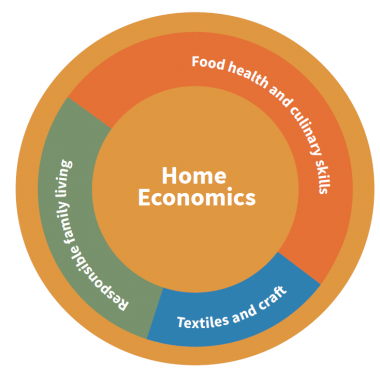| Main areas of study:
STRAND 1: Food, Health and Culinary Skills , Health and Culinary Skills
This strand focuses on developing students’ food, health and culinary skills. Students are enabled to develop a healthy, sustainable attitude and positive relationship with food through practical experiential learning. They apply their understanding of nutrition, diet and health principles in order to adopt a healthy lifestyle and make informed decisions that impact the health and wellbeing of themselves as individuals as well as within their families. The application of practical food and health literacy skills is integral to this strand and includes menu planning; shopping; cooking; health and safety food skills; portion control; reading food labels; dietary analysis; costing; sensory analysis; food waste.
STRAND 2: Responsible family living
This strand facilitates students to explore, from a systems perspective, responsible family living. Students develop an understanding of the different forms and role of families as the core social unit. They develop an understanding of the role of the family in the development of the child in a safe and nurturing environment. Students develop lifeskills to enable them to manage resources responsibly and sustainably in the home, family and community. They are facilitated to become discerning, competent consumers who are able to apply effective decision-making skills in everyday contexts in the home and community. Enabling students to become responsible and have a caring attitude towards other individuals, family members, society and the environment is integral to this strand.
Strand 3: Textiles and Craft
The students’ engagement and learning are optimised by a fully integrated experience of learning in Home Economics. To give further emphasis to the integrated nature of learning in Home Economics, the outcomes for each of the strands are grouped by reference to four elements. Each element focuses on the goals of the learning process, that is, the acquisition of new knowledge, skills and values. As the student progresses through each of the learning strands, there will be a systematic development of their fundamental knowledge, principles and values and key skills.
Elements
Element 1: Individual and family Empowerment
Across the strands, the learning outcomes in this element focus on a systems approach to individual and family empowerment. Students develop practical life skills that can be adapted to address practical, real world, perennial problems or concerns in everyday contexts in the home, family and society. They are facilitated to develop as critical, creative thinkers and problem solvers able to make informed decisions to achieve optimal, healthy and sustainable living for individuals, households, families and society.
Element 2: Health and well being
This element focuses on developing students’ knowledge, skills and understanding to make informed decisions that positively impact on their health and wellbeing of themselves as individuals as well as within their families. Across each of the three strands students are facilitated, using a systems approach, to address new and emergent practical concerns that can impact on the wellbeing of individuals, families and society.
Element 3 Sustainable and responsible Living
Across the strands, the learning outcomes in this element facilitate students to develop as future-oriented thinkers and environmentally-conscious citizens, committed to a sustainable and responsible way of life. Developing students’ self-efficacy, critical reflection and discernment in the choice and use of resources in the home; in technological change; in environmental issues and the impact of these on resource management in the home and in personal consumption for everyday living underpin the learning outcomes in this element across each of the three strands.
Element 4: Consumer Competence
This element focuses on developing students who have the knowledge, skills and understanding to make informed and discerning consumer choices that affect individuals, families and households in contemporary society. Students develop the essential lifeskills to become active, adaptable, consumer literate citizens able to apply effective decision making skills in everyday contexts. |

